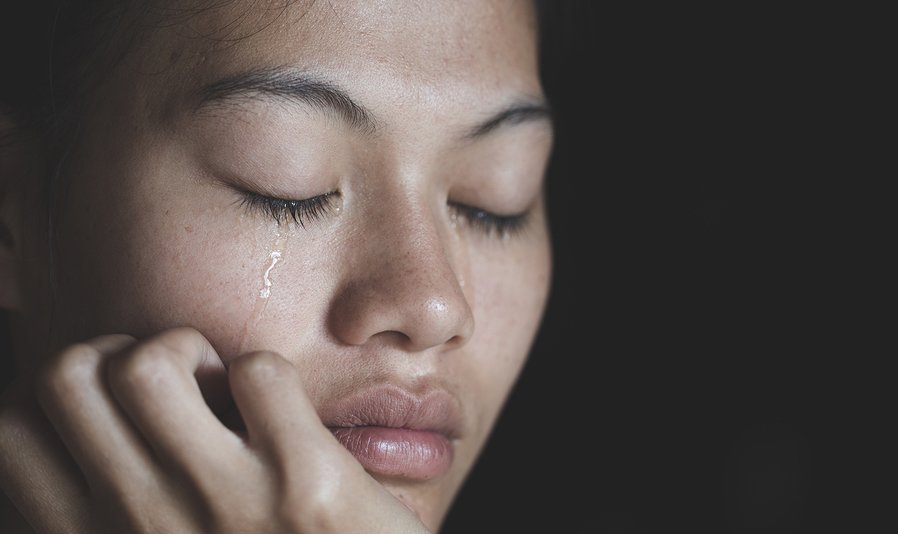Article Summary:
- Women cry about three to five times as often as men. Testosterone and other hormonal factors may influence crying frequency.
- Women’s tears reduce sex drive and testosterone levels in men.
- Crying often worsens mood in the short run but may improve mood a few hours after the cry.
- There’s considerable disagreement among experts about whether humans are the only species that cries because of emotion.
Crying and Gender
- Women cry an average of 5.3 times a month and men an average of 1.3 times per month.
- Testosterone inhibits tears, while prolactin induces tears.
While it may not surprise you that women cry two to five times more often than men, the reasons for that discrepancy might. Research shows that testosterone may inhibit crying, while the hormone prolactin may promote it.1Collier, Lorna. “Why we cry.” February 2014. APA Monitor on Psychology. 1 June 2019. http://www.apa.org/monitor/2014/02/cry Prolactin is associated with milk production and is particularly abundant in females between the ages of 15 and 30, but even in older women, it’s 60 percent more present than in men.2Ray, Clairborne, C. “The Vale of Tears.” 3 January 2011. The New York Times. 1 June 2019. http://www.nytimes.com/2011/01/04/science/04qna.html
Crying and Sex Drive
You know how men will do almost anything to keep a woman from crying? That may be because female tears make men lose their mojo. A 2011 study discovered that when men smell women’s tears, their testosterone levels plummet. In fact, the decline in testosterone is so dramatic that experts say female tears could almost be packaged as a drug to lower male sex drive. Lowered testosterone also is linked to reduced aggression levels.
The study asked female subjects who could shed sad tears at will to cry into a jar. Once the jars had a hefty level of tears, they asked male subjects to take a whiff while watching arousing films or looking at photos of women. A control group sniffed saline solution. More than two-thirds of the men who smelled tears experienced the testosterone dip, while the saline solution group experienced no such decline—and this in spite of the fact that the subjects claimed they couldn’t smell anything when presented with the jars.3Dell’Amore, Christine. “Women’s Tears Reduce Sex Drive in Men, Study Hints.” 8 January 2011. National Geographic. 3 June 2019. http://news.nationalgeographic.com/news/2011/01/110106-womens-tears-sex-drive-turn-off-sexual-health-arousal-men-science/ In the men who sniffed tears, skin temperature, heart rates, and testosterone levels all dipped, making it clear that the men who sniffed tears were less sexually aroused. MRI scans confirmed that the tears did, in fact, reduce activity in the part of the brain linked to sexual excitement.
Experts say that women’s tears may send men a chemical message to “back off,” both physically and sexually.
Mental Health Effects of Crying
Over 2000 years ago, Hippocrates claimed that crying releases “ill humors” from the brain, and Aristotle wrote that crying “cleanses the mind.” In recent times, the general sentiment has been, as stated in the song by Rosy Grier, “It’s alright to cry. Crying gets the sad out of you. It might make you feel better.”
Emotional tears do contain higher levels of stress hormones and manganese (which can help to regulate mood), compared to eye-lubricating tears, so shedding emotional tears theoretically should be helpful.4Govender, Serusha. “Is Crying Good for You?” WebMD. 3 June 2019. http://www.webmd.com/balance/features/is-crying-good-for-you#1 According to clinical psychologist Dr. Stephen Sideroff of UCLA, “[Crying] activates the parasympathetic nervous system and restores the body to a state of balance.” Japan has embraced this point of view, with crying clubs (rui-katsu) springing up nationwide where people can have a collective (and supposedly health-enhancing) sob.
According to other psychologists, though, it’s not such a simple matter. There’s some evidence that catharsis deepens depression rather than washing it away. At least one study shows that after crying, mood dips, but ultimately rises.5Almendraia, Anna. “Here’s Scientific Evidence that Crying Can be Therapeutic.” 25 August 2015. Huffington Post Life. 3 June 2019. http://www.huffpost.com/entry/benefits-of-a-good-cry-crying-science_n_55dca26fe4b0a40aa3ac4e30 The 2015 research, out of the University of the Netherlands, showed sad movies to subjects. Those who cried felt worse when the movie ended than they had before it started, but 90-minutes later, they felt better than they did at the start. Note, though, that the tears shed in the study were related to watching a sad movie rather than to undergoing a sad personal event. There’s a difference. If you’ve ever felt blown out after you’ve cried, you might question the study design.
Other research from the University of Pittsburgh found that only 30 percent of students who cried in a study reported feeling better later on.6Collier, Lorna. “Why We Cry.” February 2014. American Psychological Association. 3 June 2019. http://www.apa.org/monitor/2014/02/cry Sixty percent reported no change in mood, and nine percent felt worse.
The bottom line here is to pay attention to how you feel after you cry. Are you even more depressed or angry? Do you feel better a few hours later? Or are you left wallowing in the doldrums triggered by your own tears?
Crying in the Animal Kingdom
- Many mammal species can shed tears.
- There’s controversy about whether animal tears can be triggered by emotion.
- Studies show that animals produce brain waves similar to human brain waves in response to emotionally triggering events.
Back in 1872, Charles Darwin wrote a book called Expression of Emotion in Man and Animals. The book featured an entire chapter about a weeping elephant. More recently, Jeffrey Moussaieff Masson wrote When Elephants Weep: The Emotional Life of Animals (1996). In spite of the various claims attesting to animal emotion in these books, many scientists today believe that only humans shed tears triggered by emotions.7Smith, Amanda. “Why are humans the only animals that cry?” 23 July 2013. RN ABC. 1 June 2019. http://www.abc.net.au/radionational/programs/archived/bodysphere/features/4837824 They admit that animals do produce tears, but they say those tears serve only to clean the eyes, and are not tied to emotions like sadness or distress.
Animal behaviorists, on the other hand, would beg to differ, and research seems to back them up.8Beckoff, Marc. “Do Animals Weep as an Emotional Response?” 27 September 2013. Live Science. 1 June 2019. http://www.livescience.com/40029-do-elephants-weep-as-an-emotional-response.html Brain scans indicate that in response to fear, anger, or joy, animals have brainwaves similar to human brainwaves. A 2013 Japanese study showed that chimps responded to emotional images with brainwave patterns much like humans. And back in 2013, an infant elephant named Jhuang Jhuang stunned the world when it wept for five hours after its mother kicked it and stomped on it.9Pisani, Elana. “The Case for Crocodile Tears: Do Animals Cry?” Global Animal. 31 May 2019. http://www.globalanimal.org/2017/10/25/true-or-false-can-animals-cry/ Numerous reports document elephants weeping after the death of one of the herd.
Jhuang Jhuang aside, most animals don’t shed tears when sad. But does that mean they don’t cry? Most dog owners would argue that their dogs do cry, albeit without tears, when distressed. Mine cries when he spots his favorite friend, a labradoodle named Charlie, and when we leave him home alone, and when something hurts him—a bee sting, for instance, or getting stepped on. The sounds he makes in these cases are unmistakably emotion-laden, but I’ve never seen him shed tears.
References
| ↑1 | Collier, Lorna. “Why we cry.” February 2014. APA Monitor on Psychology. 1 June 2019. http://www.apa.org/monitor/2014/02/cry |
|---|---|
| ↑2 | Ray, Clairborne, C. “The Vale of Tears.” 3 January 2011. The New York Times. 1 June 2019. http://www.nytimes.com/2011/01/04/science/04qna.html |
| ↑3 | Dell’Amore, Christine. “Women’s Tears Reduce Sex Drive in Men, Study Hints.” 8 January 2011. National Geographic. 3 June 2019. http://news.nationalgeographic.com/news/2011/01/110106-womens-tears-sex-drive-turn-off-sexual-health-arousal-men-science/ |
| ↑4 | Govender, Serusha. “Is Crying Good for You?” WebMD. 3 June 2019. http://www.webmd.com/balance/features/is-crying-good-for-you#1 |
| ↑5 | Almendraia, Anna. “Here’s Scientific Evidence that Crying Can be Therapeutic.” 25 August 2015. Huffington Post Life. 3 June 2019. http://www.huffpost.com/entry/benefits-of-a-good-cry-crying-science_n_55dca26fe4b0a40aa3ac4e30 |
| ↑6 | Collier, Lorna. “Why We Cry.” February 2014. American Psychological Association. 3 June 2019. http://www.apa.org/monitor/2014/02/cry |
| ↑7 | Smith, Amanda. “Why are humans the only animals that cry?” 23 July 2013. RN ABC. 1 June 2019. http://www.abc.net.au/radionational/programs/archived/bodysphere/features/4837824 |
| ↑8 | Beckoff, Marc. “Do Animals Weep as an Emotional Response?” 27 September 2013. Live Science. 1 June 2019. http://www.livescience.com/40029-do-elephants-weep-as-an-emotional-response.html |
| ↑9 | Pisani, Elana. “The Case for Crocodile Tears: Do Animals Cry?” Global Animal. 31 May 2019. http://www.globalanimal.org/2017/10/25/true-or-false-can-animals-cry/ |











